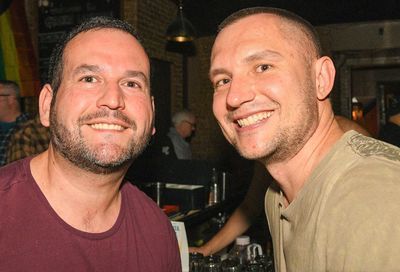South Dakota Republicans consider restricting treatments that help trans youth transition
Bill would threaten doctors who prescribe hormones or surgery to trans youth with jail time and a possible fine
By John Riley on January 24, 2020 @JRileyMW

On Wednesday, a South Dakota House committee approved a bill that would ban medical providers from prescribing hormones or gender confirmation surgery for transgender youth.
The bill, sponsored by State Rep. Fred Deutsch (R-Florence), originally made it a felony for any medical professional to provide treatments, including hormones or puberty blockers, to anyone under the age of 18.
The bill was subsequently amended to make the act of prescribing such treatments a Class 1 misdemeanor, lower the age at which a person can begin receiving the treatments from 18 to 16, and exempt medical support staff like nurses or medical assistants.
Under the revised bill, any doctor who provides transition-related treatments to a minor under the age of 16 could face up to a year in prison and a fine of up to $2,000.
The measure was approved by the House State Affairs Committee by an 8-5 vote, with three Republicans voting against it, reports The Washington Post.
Critics of the bill say this will effectively discourage doctors not to provide any form of gender-affirming health care for transgender people, lest they face criminal charges.
They also noted during the hearing that fewer than four physicians in South Dakota offer puberty blockers and hormone therapies, and it is unclear if any perform gender confirmation surgeries — thus making the bill an exercise in political posturing, rather than addressing a specific problem or need.
Proponents of the bill take umbrage — as voiced in a National Review article by Madeleine Kearns — at the suggestion that the bill is anti-LGBTQ, saying that they are concerned that transgender teenagers are too young to make permanent decisions about their health and may live to regret those decisions.
Some members of the coalition pushing for the bill are so-called “ex-transgender” people or rely on claims from people within the “de-transition” movement who say that their transition did not help them with their underlying mental health issues or depression.
Indeed, Deutsch said the impetus for the bill was meeting people who formerly identified as transgender and claimed they were “hurting and suffering” as a result of undergoing surgical or hormonal treatments.
He admitted he consulted with the anti-LGBTQ Liberty Counsel and the Kelsey Coalition, a “nonpartisan,” volunteer-run organization that claims to be interested in protecting youth who identify as transgender.
Deutsch also attended a conference, hosted by the conservative Heritage Foundation, which addressed proposals to ban transition-related treatments for youth in various states, the Post reports.
The Republicans who voted against the bill expressed reservations on how it would be enforced. Rep. Kent Peterson (R-Salem) questioned how the state would access confidential medical information and track prescriptions to ensure that they’re not being given to minors.
Majority Whip Michael Diedrich (R-Rapid City) said he was convinced by testimony from parents, transgender youth, and medical experts that puberty blockers have been helpful to people suffering from gender dysphoria, and that their effects aren’t permanent.
In fact, a recent paper published in the journal Pediatrics found that transgender youth who have access to puberty blockers are less likely to have suicidal thoughts.
Diedrich attempted to remove puberty blockers from the list of treatments banned by the bill, but his amendment was defeated.
Dr. Alexis Chavez, the medical director for The Trevor Project, a trans psychiatrist who specializes in LGBTQ youth health and has founded several trans health care clinics, criticized the bill as harmful to trans youth.
“This dangerous bill threatens responsible medical professionals with imprisonment for providing best-practice medical care to transgender youth. It cannot be allowed to become law,” Chavez said in a statement.
“The research is clear: supporting transgender and non-binary youth in their identities has positive mental health outcomes and decreases suicide risk. Cutting off access to medically necessary care will cost lives,” Chavez added. “We call on South Dakota’s lawmakers to stop using trans young people as political pawns and to instead work to create safe and affirming environments for all youth to thrive.”
Read more:
HRC to honor CNN’s Don Lemon for LGBTQ visibility and advocacy at Time to THRIVE Conference
Human Rights Campaign’s PAC issues endorsements in five 2020 U.S. Senate races
Janelle Monáe to receive Equality Award at HRC’s 2020 Los Angeles Dinner
More from Metro Weekly:
Judge Blocks Georgia Ban on Gender-Affirming Care
A federal judge has blocked Georgia state and prison authorities from denying hormone therapy to transgender prisoners.
By John Riley on December 6, 2025 @JRileyMW
Federal Judge Victoria Calvert has permanently blocked a portion of Georgia’s law banning prisoners from receiving gender-affirming care, ruling on Dec. 3 that the state’s blanket ban on hormone therapy violates the Eighth Amendment’s prohibition on cruel and unusual punishment.
Signed by Gov. Brian Kemp in May and implemented in July, the law bars prisoners from receiving hormone therapy or other treatment for gender dysphoria -- even when a doctor deems it medically necessary. It prohibits the state from funding such care and blocks transgender inmates from paying for it themselves. Non-transgender prisoners, however, may still receive hormone therapy and other gender-affirming treatments so long as the care is not related to gender transition.
NFL’s First Trans Cheerleader Says She Was Fired
Justine Lindsay alleges she was cut from the Carolina Panthers’ TopCats due to Trump’s election and a coaching change.
By John Riley on November 23, 2025 @JRileyMW
Justine Lindsay, the NFL's first out transgender cheerleader, recently revealed that she was fired this year, a decision she alleges was motivated by transphobia and Donald Trump's election as president.
"I was cut because I'm trans," Lindsay said in an Instagram Live with Gaye Magazine. "I don't wanna hear nobody saying, 'She didn't wanna come back.' Why the hell would I not wanna come back to an organization that I've been a part of for three years? That makes no sense to me. So I was cut. I was devastated. It stung. I was hurt."
Lindsay, who made history as the NFL's first transgender cheerleader when she tried out and made the Carolina Panthers's TopCats squad in 2022, told the magazine that her teammates "know the truth" about the decision to cut her from the squad.
Florida Man Charged in Killing of Trans TikTok Influencer Girlalala
Transgender hairstylist and TikTok influencer Girlalala was shot to death, and now her boyfriend faces a first-degree murder charge.
By John Riley on November 20, 2025 @JRileyMW
A Florida man has been arrested and charged with the murder of Girlalala, a 21-year-old transgender TikTok influencer, after allegedly shooting her during what appears to have been a dispute between the couple.
Broward County Sheriff's Office deputies say 25-year-old Shanoyd Whyte Jr. shot Girlalala shortly before 7 p.m. on Friday, November 14, while the two were sitting in a car on the side of the road in Lauderdale Lakes, Florida.
According to Miami-based WPLG, video from a nearby Tesla shows a man believed to be Whyte getting out of the driver's side of a sedan as Girlalala tries to exit the passenger side. He appears to grab her by the hair and force her back inside before pacing outside the car with a cellphone in hand.
Support Metro Weekly’s Journalism
These are challenging times for news organizations. And yet it’s crucial we stay active and provide vital resources and information to both our local readers and the world. So won’t you please take a moment and consider supporting Metro Weekly with a membership? For as little as $5 a month, you can help ensure Metro Weekly magazine and MetroWeekly.com remain free, viable resources as we provide the best, most diverse, culturally-resonant LGBTQ coverage in both the D.C. region and around the world. Memberships come with exclusive perks and discounts, your own personal digital delivery of each week’s magazine (and an archive), access to our Member's Lounge when it launches this fall, and exclusive members-only items like Metro Weekly Membership Mugs and Tote Bags! Check out all our membership levels here and please join us today!
The Magazine
-
Most Popular
 Most Sniffies Users Aren’t Gay, New Data Shows
Most Sniffies Users Aren’t Gay, New Data Shows  University of Oklahoma Fires Transgender TA Who Failed Student
University of Oklahoma Fires Transgender TA Who Failed Student  Jonathan Bailey Is 2025’s Highest-Grossing Actor
Jonathan Bailey Is 2025’s Highest-Grossing Actor  “Femboy” Tops PornhubGay Searches in 2025
“Femboy” Tops PornhubGay Searches in 2025  Where to Ring in the New Year in Gay D.C.
Where to Ring in the New Year in Gay D.C.  Jacob Dickey Comes Up Lucky as Sky Masterson
Jacob Dickey Comes Up Lucky as Sky Masterson  California Man Pleads Not Guilty After Gay Man Left in Coma
California Man Pleads Not Guilty After Gay Man Left in Coma  Gay Hockey Player: "Heated Rivalry" Will Keep Players Closeted
Gay Hockey Player: "Heated Rivalry" Will Keep Players Closeted  The 10 Best Movies of 2025
The 10 Best Movies of 2025  Erik Bottcher Drops Congressional Bid for State Senate Run
Erik Bottcher Drops Congressional Bid for State Senate Run
 University of Oklahoma Fires Transgender TA Who Failed Student
University of Oklahoma Fires Transgender TA Who Failed Student  Jonathan Bailey Is 2025’s Highest-Grossing Actor
Jonathan Bailey Is 2025’s Highest-Grossing Actor  Nicki Minaj Reaffirms Anti-Trans Views at Turning Point USA Event
Nicki Minaj Reaffirms Anti-Trans Views at Turning Point USA Event  Where to Ring in the New Year in Gay D.C.
Where to Ring in the New Year in Gay D.C.  Barry Manilow Reveals Lung Cancer Diagnosis
Barry Manilow Reveals Lung Cancer Diagnosis  The 10 Best Movies of 2025
The 10 Best Movies of 2025  Most Sniffies Users Aren’t Gay, New Data Shows
Most Sniffies Users Aren’t Gay, New Data Shows  Jacob Dickey Comes Up Lucky as Sky Masterson
Jacob Dickey Comes Up Lucky as Sky Masterson  Guys and Dolls at Shakespeare Theatre Company Is Showstopping
Guys and Dolls at Shakespeare Theatre Company Is Showstopping  Erik Bottcher Drops Congressional Bid for State Senate Run
Erik Bottcher Drops Congressional Bid for State Senate Run
Scene
Metro Weekly
Washington's LGBTQ Magazine
P.O. Box 11559
Washington, DC 20008 (202) 527-9624
About Us pageFollow Us:
· Facebook
· Twitter
· Flipboard
· YouTube
· Instagram
· RSS News | RSS SceneArchives
Copyright ©2025 Jansi LLC.














You must be logged in to post a comment.